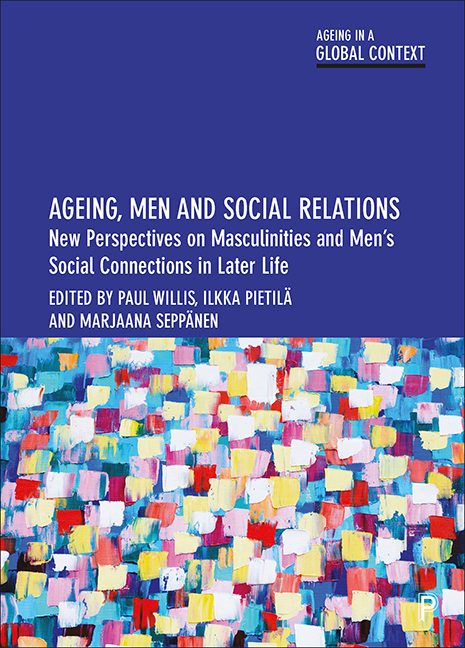 Ageing, Men and Social Relations
Ageing, Men and Social Relations Published online by Cambridge University Press: 18 January 2024
Introduction
As the population continues to age, the number of older men living longer and healthier lives is increasing. In the context of mental health, older men can be considered a vulnerable subgroup of men (Oliffe et al, 2013) with specific age-related concerns that warrant further attention. Across health and social care, a greater understanding of older men’s mental health and emotional wellbeing is called for. This chapter focuses on older men’s informal mental health coping and management practices and aims to highlight the positive ways in which men maintain mental wellbeing through routines and social connections. Moving away from the often-stigmatised term of ‘mental illness’, Williamson (2010) suggests that ‘emotional wellbeing’ may be a more helpful term to use when exploring groups such as older men. In this chapter, the terms ‘mental health’, ‘distress’ (defined as a challenging emotional experience), ‘emotional difficulties’ and ‘mental wellbeing’ are used to capture older men’s nuanced experiences of maintaining emotional wellbeing.
When experiencing distress, older men have the double-edged sword of this intersecting with the experience of gender and ageing. Mental health can be difficult to navigate as it can precipitate direct impacts on older men’s social life, self-identity and the (re)construction of the masculine self (Apesoa-Varano et al, 2015). Studies have suggested that older men are less likely than younger men to report feelings of hopelessness, sadness, anxiety or loss of interest in normal activities to health providers (Oliffe et al, 2011; Bates and Taylor, 2012; Mitchell et al, 2019), and are reluctant to disclose emotional or psychological distress because of not wanting to be labelled as depressed (Mitchell et al, 2017). Older men have similar characteristics to younger and middle-aged men, yet we need to recognise that older men may also have specific age-related mental health concerns. Likely more common in older men, contributing factors to emotional distress and mental health difficulties include cognitive decline and pain (Steffens et al, 2009), financial worries, diminished social relationships (Oliffe et al, 2011) and loss of role and status because of unemployment or retirement (Oliffe et al, 2013).
To save this book to your Kindle, first ensure no-reply@cambridge.org is added to your Approved Personal Document E-mail List under your Personal Document Settings on the Manage Your Content and Devices page of your Amazon account. Then enter the ‘name’ part of your Kindle email address below. Find out more about saving to your Kindle.
Note you can select to save to either the @free.kindle.com or @kindle.com variations. ‘@free.kindle.com’ emails are free but can only be saved to your device when it is connected to wi-fi. ‘@kindle.com’ emails can be delivered even when you are not connected to wi-fi, but note that service fees apply.
Find out more about the Kindle Personal Document Service.
To save content items to your account, please confirm that you agree to abide by our usage policies. If this is the first time you use this feature, you will be asked to authorise Cambridge Core to connect with your account. Find out more about saving content to Dropbox.
To save content items to your account, please confirm that you agree to abide by our usage policies. If this is the first time you use this feature, you will be asked to authorise Cambridge Core to connect with your account. Find out more about saving content to Google Drive.